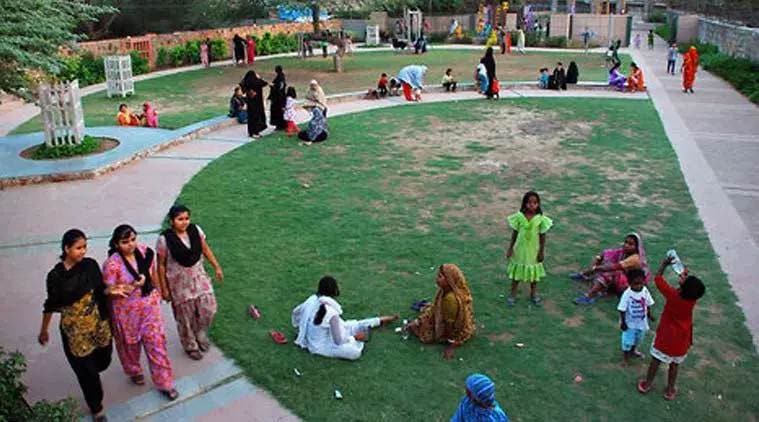 With the restrictions on playtime, children are spending more time on mobile phones, televisions and computers either as part of the online learning sessions or for entertainment.
With the restrictions on playtime, children are spending more time on mobile phones, televisions and computers either as part of the online learning sessions or for entertainment.
For around three months, Jigna Patel, a resident of Sama in Vadodara, has not allowed her six-year-old son and two-year-old daughter to step out of the house due to the Covid-19 pandemic. The playground can wait, she says adding that it is not the time to take chances.
“Children, by nature, are carefree and curious. They touch many things and then wipe their face or brush their hair off with the same hands,” she says.
Jigna, who lives in an apartment, says she has tried to engage her children in many cognitive activities for their age but they have their “moments of banging the doors in frustration”.
“I feel bad when they have their moments of boredom turning into tantrums and meltdowns, wanting to go out but I know this is only a matter of time,” she says.
Many parents like Jigna have restricted the movements of their children since the lockdown began. Anuj Patel, a businessman from Anand, who has a four-year-old son, says it has been difficult to keep the child indoors.
“He’s too young to understand why the restriction doesn’t seem to end. It is very tough on him but my wife and I try to spend a lot of time playing with him.”
While several parents are confused whether to allow children together in playgrounds, experts recommend that interactions for elder children, who grasp the meaning of social distancing, could be fine but for the younger ones, the playground should be off limits for now.
“Most children might remain asymptomatic or unaffected by the virus but could definitely infect others. Children under 10 years are vulnerable themselves,” says Dr Nimisha Pandya, consulting paediatrician at Gujarat Med-ical Education and Research Soc-iety (GMERS)-run hospital in Gotri.
“Parents can accompany children for short walks in the open and keep them away from touching surfaces… In a playground, most equipment are made of metal and can hold viruses for long,” she adds.
Professor Mandakini Jha, Department of Sociology, Faculty of Arts, Maharaja Sayajirao University of Baroda, feels that the need for social distancing will change the way playgrounds are pictured.
“Children playing football may hug each other when they score a goal. Social distancing will mean this is compromised. It brings us to the question of the future of conventional sports like wrestling… playing alone can lead to emotional stress and social isolation,” Jha says.
With the restrictions on playtime, children are spending more time on mobile phones, televisions and computers either as part of the online learning sessions or for entertainment.
Preeti Zaveri, Surat-based International Life skills trainer and academic counsellor attached to Lions Quest that runs a comprehensive Social and Emotional Learning (SEL) program, feels that the current situation shifts a lot of onus on parents to encourage children to develop discerning skills.
“Our online sessions for elder children focus on self-directed learning, building confidence and managing emotions. For younger children, it is tough and it will be a while before interactions become normal again. But until then, parents will have to find ways to encourage learning not just of textbooks but also skills that can help and keep them engaged,” says Zaveri.
Tejal Amin, Chairperson, Navrachna Education Society, says that while children and teachers seem to have already adapted to online classes, playgrounds will also find their way out. Amin says, “It has been heartening to see how our teachers and students have adapted to the temporary solutions with online classes. Teachers have made efforts to change their styles — sentences have to be shorter and they have to modify the tone of their voice.”
Amin says that when schools reopen, team sports will also have new protocols. “Games that have to be played on a ground will see new rules,” she says.
Sociology experts have raised concerns about discrimination in the garb of social distancing. Jha says, “A playground can become a site of discrimination —who plays with whom —the reason could be medical or not.”
Professor Nandini Manjrekar of Tata Institute of Social Sciences, is not sure if the trend of conducting online classes is enough to ensure an overall growth of children. “We are already living in a world where spaces are segregated on the basis of religion, region, caste and sex. Parents need to understand plural cultures, values of social justice and pass them on to their children in such times,” she says.
Secretary (Primary and Secondary Education), Gujarat, Vinod Rao, who is also an Officer on Special Duty for Covid-19 to Vadodara, says that the first half of the upcoming academic year will be a challenge but the situation would normalise later. Rao said, “Children are largely unaffected or mildly affected by the virus but they can be potential carriers. The reopening of schools will be in a phased manner… If the trajectory of the pandemic is under control, we will positively see a normal second session of the year.”